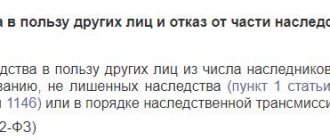Who is the unworthy heir?
An unscrupulous heir is a person who does not receive the right to inheritance after the death of the testator. The concept of an unworthy heir can be divided into several groups, each of which will include persons who have lost their right to inheritance for certain reasons. So, unworthy heirs include:
- Citizens who, by their actions, put pressure on the testator and thereby provoked an increase in their share in the inheritance or even forced the person to write a will and recognize himself as the main claimant to the property.
An example of this situation would be the death of a father, after which the children began to quarrel over his inheritance. At the same time, the daughter kills her brother, committing a crime against another successor. In fact, after this her share of the inheritance should have increased, but the court eliminates her right to receive the property of her deceased father, even though she is the first priority applicant.
- Unworthy heirs are citizens who, through their actions, caused physical injury to the testator or even provoked his death.
An example of this situation would be a fight in which a drunken son kills his father. The son committed a crime against the testator - his father, and this is a good reason for removing him from the inheritance. According to the law, the court will decide to recognize the son as unworthy of the inheritance.
- Persons who, by their actions, prevented the implementation of the last will of the deceased, and distorted the essence of the will, if any.
Example: before his death, a man left a will in which he transferred all property to his illegitimate son. The legitimate daughter, having learned about this, destroyed the will in order to receive the inheritance from her father in accordance with the law.
- Unfair heirs are also parents who are deprived of parental rights in relation to the deceased child - the testator. If a parent did not fulfill the responsibilities assigned to him in raising a child, then he has no rights to his property. This also includes fathers who have not paid child support during their lifetime.
It will be interesting to know that declaring an heir unworthy can also apply to people who claim an obligatory share in the inheritance. A person who, when submitting an application to a notary, concealed the presence of other heirs, may be accepted as unworthy.
The removal of the heir from his rights also entails the deprivation of the share and their descendants, that is, if the son is found unworthy of the inheritance, then his children - the grandchildren of the deceased, who could enter into the inheritance by right of representation - cannot claim the property of their grandfather.
Heirs' shares
A court decision is also necessary so that the notary, when determining the circle of heirs, can correctly calculate their shares (since the removal of an heir entails an increase in the share of other heirs) and issue legal certificates of the right to inheritance.
Thus, Resolution of the Plenum of the Supreme Court of the Russian Federation dated May 29, 2012 N 9 “On judicial practice in inheritance cases” states that when issuing a certificate of the right to inheritance, a notary first analyzes all the documents available in the inheritance case:
- statements from heirs regarding acceptance of inheritance;
- documents confirming the degree of relationship, marriage and other relations of the heirs with the testator;
- wills, possible revocations of wills, testamentary refusals and assignments;
- applications for refusal of inheritance;
- grounds for increment of hereditary shares;
- existing court decisions;
- other documents and information.
At the same time, the notary finds out whether there are other heirs who are subject to inheritance, and also whether there are unworthy heirs among the citizens who accepted the inheritance (Article 1117 of the Civil Code of the Russian Federation).
In practice, rarely anyone is puzzled by the issue of recognizing a particular heir as unworthy. As a result, the unworthy heir calmly enters into inheritance rights, and this is possible solely because the necessary corresponding court decision is missing.
My article is intended to protect the rights of citizens - worthy heirs from violation of their rights by unworthy heirs. I would really like to hope that at least someone, having read this article, will make an attempt to stock up on useful evidence in case of opening an inheritance and will still receive the cherished decision, which in the future will be able to protect against illegal inheritance.
How to recognize a citizen as an unworthy heir?
The procedure for depriving an heir of an obligatory share of inheritance
The grounds for recognition as an unscrupulous heir are clearly described in the Civil Code. If you want to find one of the legitimate applicants unworthy, you need to prepare a lawsuit in court. If there is an unworthy heir in the family, a qualified lawyer or notary will tell you how to prove it, and he will also tell you how to correctly draw up an application for deprivation of inheritance rights. In addition to the application, you should collect a package of documents, which includes:
- receipt of payment of state duty;
- a copy of the application in triplicate;
- death certificate of the testator;
- documents confirming the status of the plaintiff (you must present documents confirming your relationship with the deceased person);
- proof that the heir evaded his obligations towards the testator, committed a crime against him or put pressure on the deceased person, as a result of which he distorted his last will.
The claim is filed at the place where the unscrupulous heir is registered. Within 7 days, the judge registers the application and sets a date for consideration of the case. If the claim is satisfied and it is possible to prove that the person is unworthy, then he is deprived of the inheritance. The court decision must subsequently be submitted to the notary who is handling the inheritance case.
It is very important to note the fact that people who inherit property under a will do not have the right to file an application to court to determine an unworthy successor. Only successors by law, that is, blood relatives, have the right to prove the unworthiness of one of the applicants for the property of the deceased.
Consequences of unworthiness
An unworthy heir loses all rights to receive the testator's inheritance. He does not have the right to receive an obligatory share, part of the property in the event of refusal in his favor by other heirs.
And even if the deceased testator no longer has any heirs, his property will be transferred not to the unworthy heir, but to the state.
The consequences of unworthiness extend not only to the heir himself, but also to his followers (children and grandchildren).
When the inheritance case is not closed by the notary at the time the heir is recognized as unworthy, his name is simply excluded from the certificate of inheritance.
If an unworthy subject manages to receive the inheritance and even dispose of it, returning the inheritance becomes a difficult task.
A bona fide purchaser is protected by law in such a situation . And most likely, the unworthy heir is simply obliged in court to pay monetary compensation to the heirs whose rights have been infringed.
How is property returned from unworthy heirs?
As the law says, property that was inherited by unworthy persons is considered their unjust enrichment. Based on the standards described in Articles 1104–1106 of the Civil Code of the Russian Federation, it must be returned to its rightful owners. That is, the unworthy successor is obliged to return in full the property that he inherited. If he has not yet received the right of inheritance, then his part is divided in equal shares among the remaining successors, and the right of ownership is given to the share of the unworthy.
If, as a result of illegal enrichment, things have lost their primary appearance, the violator must compensate for all the deterioration of things that occurred after he was found unworthy. If it is impossible to return the property, the receiver pays the cost of the property in cash.
If there was an entry into an inheritance where the subject of the inheritance was a business or some enterprise, then the unworthy owner must compensate the remaining recipients for all income from the possible use of the property.
The concept of unjust enrichment includes the provision that interest will accrue on the amount of unjust enrichment from the day the citizen is recognized as an unworthy recipient. Therefore, if a person evades paying compensation to other claimants for property, he will ultimately be brought to administrative and even criminal liability, and his current property will be seized.
How to issue a power of attorney to conduct an inheritance matter?
Cases of recognizing legal heirs as unworthy
The official recognition of an heir as unworthy occurs for various reasons. But more often the following factors influence deprivation of inheritance rights:
- The owner of the inheritance or his relatives are blackmailed and threatened.
- Intentional misrepresentation of the testator, which affected the drafting of the will.
- The use of physical force to control the process of drawing up an official paper, on which the further division of material wealth between the heirs depends.
- Intentional concealment, falsification or destruction of a will.
- The legal deprivation of one or both parents of rights in relation to the testator at the time of his death.
- Deliberate harm, murder of the testator or one of the heirs.
- Recognition of an heir as unworthy is practiced in relation to citizens who evade payment of assigned alimony for the maintenance of the owner of the inheritance. Legal provisions cover capable close relatives who refuse to provide required financial assistance to disabled relatives.
- Forcing other legal successors to renounce their due inheritance in writing.
- In court, an heir can be declared unworthy if the citizen made attempts that resulted in non-payment or a deliberate reduction in the amount of alimony. For example: deliberately hiding the amount of income, changing your permanent address of residence or work.
The recognition of an heir as unworthy is strictly controlled by the current Civil Code, which is why controversial issues can be clarified by a certified lawyer.
Committing illegal actions in relation to the testator or his property
In Art. 1117 of the Civil Code of Russia clearly spells out life situations when it is permissible to recognize an heir as unworthy. If the testator has property that several applicants would like to receive at once, then one of the parties may decide to take illegal actions against the testator and his property. This situation is one of the most common, which is why the court often issues a verdict declaring the main heir unworthy.
Causing harm to health for the purpose of taking possession of bequeathed property
Due to the division of property, an attack on the life and health of the owner of material wealth cannot be ruled out. Citizens resort to prohibited actions who, in order to increase the allotted portion of the inheritance, threaten the testator and his relatives. It is possible that serious harm may be caused to the testator - deprivation of life for material reasons. Black realtors can get involved. In this case, official recognition of the legal heir as unworthy is considered inevitable.
Deception, use of cunning
The recognition of the legal heir as unworthy can be carried out due to fraudulent actions. The motives for illegal actions are based on obtaining possession of expensive property, because of which people are ready to violate the Civil Code. Criminals resort to deception and forge certificates and other papers. Such people do not pursue the goal of causing physical harm or exerting psychological pressure on the testator. Fraudsters make efforts to get the owner of movable and immovable property to transfer their rights. It is possible that facts and registered papers may be manipulated for one’s own benefit. If fraudulent actions are revealed, then recognition of the heir as unworthy will be inevitable.
Murder of the testator
There may be several reasons for deeming an heir unworthy. The most dangerous event is when, due to the desire to receive the bulk of the inheritance, a citizen decides to kill the testator. If the relatives of the testator are interested in the fact of how it can be proven that the heir is unworthy, then they should study the legislative norms or consult a lawyer. After the murder of the testator, the citizen is automatically recognized as unworthy. The remaining co-heirs do not need to involve the judicial authorities.
Rules for drawing up a claim for recognition of an unworthy heir
Like any legal document, a claim to declare an heir unworthy has a clearly regulated structure. You can seek the help of a qualified notary or try to draw it up yourself. The application should be structured as follows:
- The name of the court where the case will be heard.
- Full name of the plaintiff.
- Full name of the defendant.
- Full name of the third party, usually a notary.
- Document's name.
- The main part of the document - here you indicate your first and last name, the degree of relationship with the deceased, your right of inheritance in turn, and the person who is considered unworthy is indicated. The subject of the inheritance is characterized and the reason for recognizing the citizen as unworthy is described.
- Evidence of the heir's guilt - this may be the number of the certificate of the court decision on the commission of a crime against the testator, the number of the document indicating the deprivation of parental rights or information from a notary who will confirm that the second citizen hid from him the presence of other claimants to the property or interfered with the execution of the last will deceased.
- Appeal to the court - begins with the word “I ask”, here you ask the court to recognize the citizen as unworthy of the inheritance.
- List of attached documents.
- List of witnesses who are involved in your case.
- Date of preparation of the document and signature of the plaintiff.
The document must not contain abbreviations, crossing out or corrections. The progress of the case directly depends on how correctly you draw up your claim. If irrefutable evidence of the guilt of one of the heirs against the testator is attached, your claim will be satisfied at the first hearing.
To summarize, I would like to say that if you do not want to encounter legal red tape in which your loved ones decide to deprive you of your legal right to the property of a deceased relative, try to maintain good relations not only with the testator during his lifetime, but also with relatives after his death.
Comments on Article 1117 of the Civil Code of the Russian Federation, judicial practice of application
In pp. 19, 20 of the Resolution of the Plenum of the Supreme Court of the Russian Federation dated May 29, 2012 N 9 “On judicial practice in inheritance cases” contains clarifications of a number of provisions of Article 1117 of the Civil Code of the Russian Federation on unworthy heirs.
Unlawful actions directed against the testator, his last will or his heirs must be intentional and not careless
The illegal actions specified in paragraph one of paragraph 1 of Article 1117 of the Civil Code of the Russian Federation, directed against the testator, any of his heirs or against the implementation of the last will of the testator expressed in the will, are grounds for the loss of the right to inherit if such actions are intentional and regardless of the motives and purposes of commission (including when they were committed on the basis of revenge, jealousy, hooligan motives, etc.), as well as regardless of the occurrence of the corresponding consequences.
Illegal actions directed against the implementation of the last will of the testator, expressed in the will, as a result of which citizens lose the right of inheritance on the specified basis, may consist, for example, in forging a will, its destruction or theft, forcing the testator to draw up or revoke a will, forcing heirs to refusal of inheritance.
An heir is recognized as unworthy only if there is a verdict or court decision
The heir is unworthy in accordance with paragraph one of paragraph 1 of Article 1117 of the Civil Code of the Russian Federation, provided that the circumstances listed therein, which are the basis for exclusion from inheritance, are confirmed in court - by a court verdict in a criminal case or a court decision in a civil case (for example, on invalidation will made under the influence of violence or threat).
A separate court decision declaring an heir unworthy is not required
A court decision declaring the heir unworthy in accordance with paragraphs one and two of paragraph 1 of Article 1117 of the Civil Code of the Russian Federation is not required. In the cases specified in this paragraph, the citizen is excluded from the list of heirs by the notary in charge of the inheritance case, upon providing him with the appropriate verdict or court decision.
Removal from inheritance in the event of a court decision to collect alimony for the maintenance of the testator and malicious evasion of the heir from paying it
When considering claims for exclusion from inheritance by law in accordance with paragraph 2 of Article 1117 of the Civil Code of the Russian Federation, courts should take into account that the obligations specified therein to support the testator, malicious evasion of which is the basis for satisfying such requirements, are determined by the alimony obligations of family members established RF IC between parents and children, spouses, brothers and sisters, grandparents and grandchildren, stepsons and stepdaughters and stepfather and stepmother (Article 80, , , , - and). Citizens may be excluded from inheritance on this basis if the obligation to support the testator is established by a court decision to collect alimony. Such a court decision is not required only in cases concerning the provision of maintenance by parents to their minor children.
The malicious nature of the evasion in each case must be determined taking into account the duration and reasons for non-payment of the relevant funds.
The court removes the heir from inheritance on the specified basis if it is proven that he has maliciously evaded the duties of supporting the testator, which can be confirmed by a court verdict of conviction for malicious evasion of paying funds for the maintenance of children or disabled parents, or by a court decision on liability for untimely payment of alimony , a certificate from bailiffs regarding arrears of alimony, and other evidence. Not only the failure to provide maintenance without good reason, but also the concealment by the person obligated of alimony of the actual amount of his earnings and (or) income, his change of place of work or place of residence, and the commission of other actions for the same purposes can be recognized as malicious evasion of these duties.
Who can go to court with a claim to remove an unworthy heir from inheritance?
A claim for exclusion from inheritance on this basis of an unworthy heir can be filed by any person interested in being called to inherit or in increasing his share of the inheritance, a legatee or a person whose rights and legal interests (for example, the right to use an inherited residential premises) may be influence the transfer of inherited property.
Impossibility of concluding a settlement agreement
The court refuses to approve a settlement agreement between the parties on the issue of determining whether the parties have rights of inheritance and the composition of heirs (Articles 1116, 1117, 1121, 1141 of the Civil Code of the Russian Federation) (clause 10 of Resolution of the Plenum of the Supreme Court of the Russian Federation No. 9).









